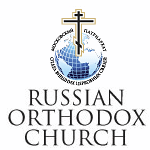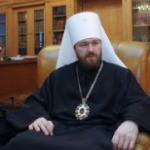
Deprecated: trim(): Passing null to parameter #1 ($string) of type string is deprecated in /home/aoiusa/public_html/wp-content/plugins/sexybookmarks/public.php on line 388
Deprecated: trim(): Passing null to parameter #1 ($string) of type string is deprecated in /home/aoiusa/public_html/wp-content/plugins/sexybookmarks/public.php on line 394
Deprecated: trim(): Passing null to parameter #1 ($string) of type string is deprecated in /home/aoiusa/public_html/wp-content/plugins/sexybookmarks/public.php on line 400
Source: Department for External Church Relations of the Russian Orthodox Church
Highlight:
At present we are experiencing a new era of persecution against Christians, which some compare to the time of the Roman emperors of the first three centuries. People in problem-free countries know nothing or do not want to know anything about it. Only a handful of public and human rights organizations are trying to draw public attention to this disastrous situation.

Paper by Metropolitan Hilarion of Volokolamsk, Chairman of the Moscow Patriarchate Department for External Church Relations, at the International Conference on Christian-Jewish-Muslim Inter-confessional Dialogue (Budapest, 2 June 2011)
Distinguished Participants in the Conference,
Allow me to present to you my remarks concerning problems of the free confession of faith in the world and in some of its parts and on religious cooperation in this area.
The freedom of conscience is a fundamental and commonly accepted human right affirmed in all the international human rights conventions without exception. Any persecution of a person on the grounds of faith is not only inadmissible but also utterly immoral. Precisely for this reason the European community and international organizations have long exerted every effort to oppose the spreading of such phenomena as Islamophobia and anti-Semitism. This stand is aimed to assert justice and rule of law in society so that believers may feel protected. This attitude is even more relevant in the light of intensive migration processes resulting in a change in the religious and ethnic picture in Europe. Thus, in 1992 in Western Europe there were over 7 million Muslims; in 2004 in the European Union there were already 15 million Muslim residents. At present there are up to 24 million Muslims living in Europe. And we can see that the authorities in European countries are doing a lot to make newcomers and native Europeans of Islamic background to feel not social outcasts or second-rate people but people enjoying equal rights and freedoms with all the others, including in the religious sphere.
However, this situation is not prevailing in each country and region in the world. In the 21st century we have come to face cases of persecution against Christians, beginning from infringement on their civil rights to physical violence and killing. According to the data published in this mid-May, today at least 100 million Christians are subjected to persecution and discrimination in the world. At least one million of them are children. This cannot but raise our profound concern.
At present we are experiencing a new era of persecution against Christians, which some compare to the time of the Roman emperors of the first three centuries. People in problem-free countries know nothing or do not want to know anything about it. Only a handful of public and human rights organizations are trying to draw public attention to this disastrous situation.
I will remind you that about 1, 5 million Christians used to live in Iraq until 2003. Now they are no more than a half of this number, while those who have remained in the country fear for their life every day. Since last October when terrorists burst into a Syrian Catholic cathedral in Baghdad killing 52 people, the Christian community in Iraq have lived in constant fear of new attacks and terrorist actions.
Reports about the oppression of Christians come from Egypt, Sudan, Afghanistan and other countries. The notorious legislation ‘on blasphemy’ enacted in Pakistan is sometimes used to doom Christians to death or to put them in prison.
The idea of violence and disrespect for other religions is alien to Islam, which is a peaceful religion. The Quran clearly states that the existence of other religions of biblical tradition along with Islam is Allah’s will. The Islamic Holy Book affirms that every religious community is tested in what it was granted from above. These communities are called to compete in good works, while a deep sense of their differences will be revealed only in the eschatological perspective (Quran 5:48). The Quran points to the need to respect ‘the people of Scriptures’ – both Christians and Jews.
There is another aspect of the problem of persecution against Christians, which must be mentioned. It is linked with the idea of Christianity generated in the Islamic world by ill-considered and sometimes even ill-intended actions by extremists and various charismatic sects. Let us remember the pastor from Florida who committed sacrilege towards the Quran. There are also sectarian movements engaged in aggressive activity disrespectful to local traditions among Muslims. All this leads to a distortion of the image of Christianity, just as the actions of Islamic sects present a corrupted image of Islam.
Noticeably, the cases of persecution against believers do not involve only Christians but also Muslims and Jews. The undeclared war against muftis in Russia’s Northern Caucasus has become a real tragedy. I will remind you that among its recent victims is the chairman of the Muslim Board for Kabardino-Balkaria, Anas-haji Pshihachev. We cannot but recall the death of Shiah Muslims in Iraq and numerous victims of terrorist actions in Israeli cities.
Today we can ever more clearly see that there are forces in the world which are interested in fomenting interreligious strife and creating hotbeds of instability. For these purposes, modern information technologies, social networks and indoctrination methods are used. We can oppose to this evil will our endeavour for peaceful coexistence and resolution of conflicts on religious grounds.
Now as never before it is important to enter into intensive interreligious dialogue for enabling each community to bear witness to its faith and tradition and to strengthen good-neighbourly relations and mutual understanding. I believe this dialogue should not be limited to general statements and calls not committing anyone to anything but should become a real contribution to relieving the situation of believers. Religious leaders should oppose intolerance towards Christians, Muslims and Jews. No such case should remain unnoticed in the flow of daily news and events. We all in our places are called to do all that depends on us. Only in this case the voice of people of faith will become a convincing and powerful voice of truth. I am aware of the active position taken by the Conference of European Churches and the Council of Bishops’ Conferences in Europe who have called the EU countries to resolute actions against discrimination of Christians on the globe. During the Passion Week, Catholics around the world prayed for the persecuted Pakistani Christians.
There are a number of human rights organizations based and successfully functioning in Europe. They specialize in monitoring the situation with regard to intolerance on the grounds of faith including the situation of Christians and in giving material and legal aid to those who have been subjected to persecution.
I cannot but note the position taken by the Republic of Hungary. Hungary is among those countries which have repeatedly drawn attention of the European community to the act of aggression committed against the Copts in Egypt on the 1st of January 2011. It was during the chairmanship of Hungary in the European Union that the EU Committee of Ministers instructed the High Representative of the Union for Foreign Affairs and Security Policy, Ms Catherine Ashton, to report on the steps taken by the EU for protecting the freedom of faith. It is my conviction that Hungary will continue to initiate and support the adoption of documents for protecting Christians on European and global levels. Among the already adopted documents is the European Parliament’s Resolution of January 20, 2011, on the Situation of Christians in the Context of Freedom of Religion and the similar resolution adopted by the Council of Europe Parliamentary Assembly.
In my view, Russia’s experience can prove helpful in opposing intolerance on religious grounds. In our country, Christians, Muslims and Jews have lived as good neighbours for centuries. In the history of Russia there have been no wars on religious grounds. In today’s Russian Federation, Muslims, who are a religious minority, enjoy no lesser rights than the Orthodox Christians who are a majority. In addition, the state in a number of cases gives Muslim communities more assistance than other religious organizations. For instance, there are programs of the state’s financing the Islamic education and pilgrimages to Mecca.
It is gratifying that it is in Hungary that we discuss so an important and sensitive task as protection of freedom of religion in the world. The people of this country set an example of commitment to their own historical religious and ethical tradition while recognising and respecting others. An important testimony to this is Hungary’s new Constitution adopted by the parliament in April 2011, stating that the Hungarian people are united by ‘God and Christianity’ and sealing the principal ethical postulates shared by the society.
In conclusion of my remarks I would like to underscore once again that a pro-active position of religious leaders and their moral authority in society and among believers can help reverse the alarming tendency in the sphere of freedom of religion in a number of countries in the world and serve as a testimony to the lofty ideals of good, justice and love for both those who are near and who are far.
